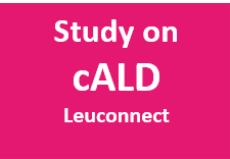
To better understand the impact of Cerebral Adrenocleucodystrophy CALD) on the quality of life of patients and their families
Adrenoleukodystrophy (ALD) is a rare metabolic disorder caused by mutations in the ABCD1 gene that lead to a toxic accumulation of very long-chain fatty acids (VLCFAs). It is an X-linked disease that mainly affects boys. About 40% of them will develop the cerebral form of the disease (CALD). Early diagnosis of CALD is essential to enable treatment to be administered before symptoms appear and the disease progresses.
To better understand the impact of the disease on the quality of life of patients and their families, Bluebird Bio conducted a study on the Leuconnect platform, in partnership with ELA and in collaboration with the independant research firm ARGO Santé. The use of the Leuconnect platform, the involvement of the research and ELA teams, and the support of the families, allowed for the expected recruitment and the rapid implementation of the study. The study was carried out in a record time of one month (from December 2020 to January 2021). It involved 12 carers (women) and covered 14 children. Of these 14 children, 12 are alive (2 of whom received a transplant) and 2 died at the time of the study. The mean age of diagnosis was 8.3 years, the mean age of the children at the time of the study was 12.5 years and the mean delay in diagnosis was 4.2 years. Of these 14 children, 11 lived in the carer's home.
The results of the study point to a complicated diagnostic pathway. News of the disease is traumatic and referral to medical care is not always recommended. It is even less often suggested than psychological guidance or psychomotor monitoring. The majority of children who have not received a stem cell transplant are currently totally dependent, and their quality of life is severely impaired. For those who were able to receive a transplant, after a very heavy burden of managing the treatment, their parents describe their lives as "normal" today.
In addition to the symptoms, the medical and paramedical care associated with the disease is burdensome. It means a minimum of 4 appointments per week. On average, one appointment per year is scheduled with a neuropediatrician or neurologist, often far from home, which means that at least one full day is required. The child's medical journey is punctuated by numerous hospitalisations throughout the year, and the medication intake is significant. Carers spend an average of 7 hours a day on the health of their sick children, in addition to the normal care for a child. The results of the study highlight many needs, financial of course, but also a need for psychological care and for respite and more time.
For more than 10 years, ELA has invested heavily in ALD research and supports all initiatives that can change the lives of patients, such as gene therapy. The association warmly thanks the families who participated in this study and their psychological and moral involvement, which can be at times painful, but so precious for the understanding of the disease and its management.
Opening of a study on cALD patients and their caregivers - Completed
There are no studies in France on the burden of cerebral adrenoleukodystrophy (cALD) on the children affected and their families.
In partnership with ELA International, and accompanied by ARGO Santé, a health research and consulting firm, BlubirdBio is launching a study on the impact of the disease on boys with cALD.
What is the objective of this study?
The objective of this study is to better understand the impact of the disease on patients and their families in order to assist in diagnosing the disease early, treating symptoms and implementing actions to improve the quality of life of patients and their families.
Who can participate?
It is intended for adult caregivers, resident in France, of children diagnosed with cALD before the age of 18 and for less than 10 years. However, if the individual is a caregiver of several children diagnosed with cALD and one of them has been diagnosed with cALD for more than 10 years, the caregiver may participate in the study for the other children who are ill.
How is the study going?
This study addresses different aspects of the life course, the diagnosis experience, the effects of care, and the daily life of the affected child and that of their family, as well as the consequences on the caregiver's professional life and the family's financial resources.
It takes place online on Leuconnect, using questionnaires that the caregiver can answer according to their availability. It will be supplemented by a telephone interview of approximately 30 minutes on the description of the care pathway.
This survey is conducted confidentially in accordance with the legal standards governing Leuconnect.
Your testimony is extremely valuable and your expertise on the disease is invaluable to research.
Thanks to you, research is accelerating!